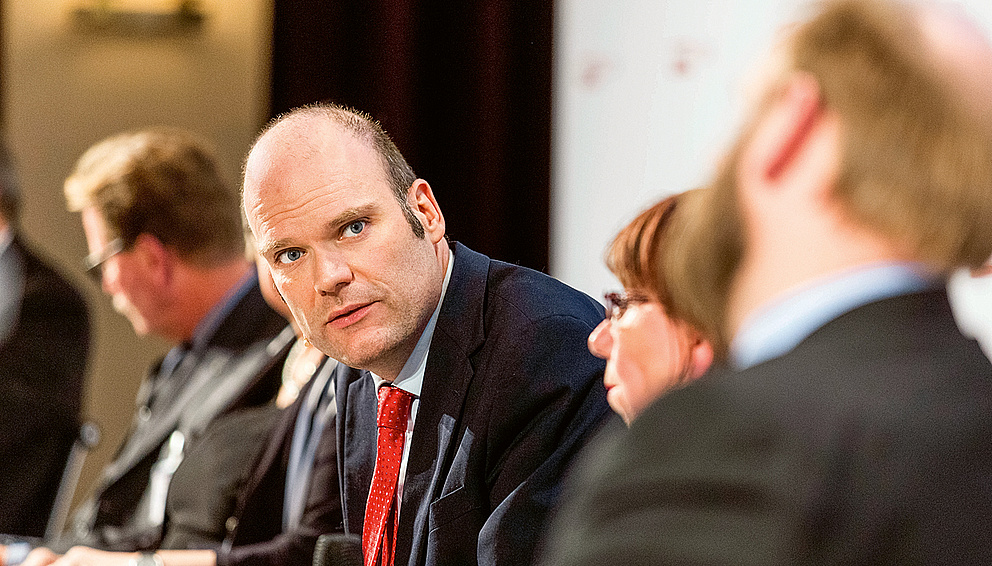Jump to the content
- {{#headlines}}
- {{title}} {{/headlines}}

Do join in!
We want to take this topic of diversity beyond the limits of the Humboldt Kosmos magazine. Let’s talk about it! We look forward to sharing your thoughts or your own experiences on #ProgressDiversity.

Something is happening in German science. “Diversity and excellence – for me, these two concepts are inseparable,” said Katja Becker, the new president of the German Research Foundation (DFG), at the beginning of 2020. And she did not just mention this casually but made it a core message upon taking office. It was just the same in nature, she continued. “The rainforest develops more dynamically than agricultural monoculture.” The more multidimensional diversity in science became – not just amongst scientists themselves but also with regard to funding formats, topics and international collaborations – “the more exciting new combinations and research results we shall see.”
The DFG is the largest funding organisation in German research. It seldom takes the lead, but when it comes to standards and scientific procedures universities and scientific institutions usually follow its course. Which means that when a DFG president makes a statement, it is not just an empty phrase. It will have consequences.
Another example: The minute she took office, the new rector of TU Dresden, Ursula Staudinger, who had just returned from the United States, immediately emphasised that diversity and inclusion in every guise should “not only somehow be tolerated but utilised for the continued development of our university”. The great leaps in science happened, above all, at the boundaries and intersections “between the disciplines, between the subject-specific perspectives and between the different people who express them and listen to each other”. And then Staudinger also drew a comparison with nature or, rather, agriculture: “When you have a monoculture, productivity drops.”
Two new women bosses at the head of leading German science institutions, the one at the largest research funder, the other at the only East German university of excellence outside of Berlin. Two institutions that are renowned for outstanding science. And they both say, right, the way we have been doing things in Germany so far is no longer fit for purpose. That is remarkable.

The fact that they both refer to monoculture as the obverse of their ideal is no coincidence either. Anyone looking at the German science system with its professors of whom under ten percent have a foreign passport, of whom three-quarters are men who largely come from academic families, with hardly a single one from an immigrant family, anyone looking from the perspective of more diverse systems like the one in the US is amazed that the German higher education landscape could have worked so moderately well for such a long time. But they also know that given the extent to which the societies and science systems around Germany are changing, this will not continue for very much longer.
Many words, few actions
Moreover, you cannot help getting the feeling that whilst many people talk about and invoke diversity, when it comes to appointments, to drawing up new funding lines or research projects, they sometimes ignore it altogether and almost never act strategically and systematically. Perhaps they have only learned to say the “right” thing but are still basically unconvinced that more diversity would make science not only morally better but qualitatively better, too.
Indeed, you do not have to search far amongst professors in this country to hear voices claiming diversity is just an adjunct of social policy: well-meant, but largely deleterious to research quality. Excellence, they say, is only generated by hard, competitive science – not by thoughts of offsetting disadvantages and special support programmes.
They like to point out that there are hardly any scientific studies that conclusively prove the added value of diversity for scientific productivity – a claim, by the way, that the Dresden TU rector Ursula Staudinger would hardly contest. Whilst studies have been conducted, especially in corporate and organisational research, they reveal, above all, that diversity is not a sure-fire success. “It’s not enough to sit old and young, men and women, next to each other round the same table, perhaps with the odd token foreign woman for good measure and expect the creative ideas to flow. It doesn’t matter whether it’s a company or a university, you need an organisational culture that is based on mutual esteem and promotes innovations.”
Don’t wait for the studies
You will certainly not achieve a culture of this kind, however, if you do not believe that diversity can mean more to an academic institution than just a benefit on the human level. Moreover, to expect studies to first of all demonstrate – above all for Germany – that diversity leads to greater excellence does not seem to hold water in my opinion: Are there then genuinely serious scientific studies the other way round, proving that white men with comparable career credentials and without the traditional social bias to their advantage are demonstrably better scientists?
Yes, it is a normative statement to say that diversity makes science better. But the current science system shaped by unequal opportunities is also highly normative. It prevents many from following their aspirations and development opportunities and impedes new approaches and unusual ideas.
Perhaps it is not necessary to realise that nearly all the world’s leading universities are in countries that have made diversity a core principle of science. Perhaps a little healthy common sense and personal experience are enough to comprehend that, always and everywhere, knowledge and progress derive from productive opposites and intellectual tension.
